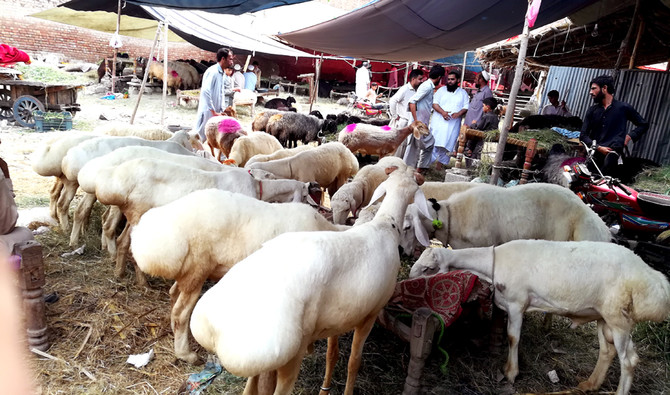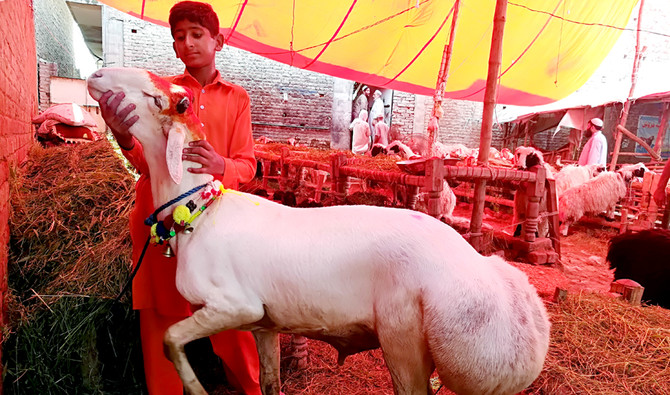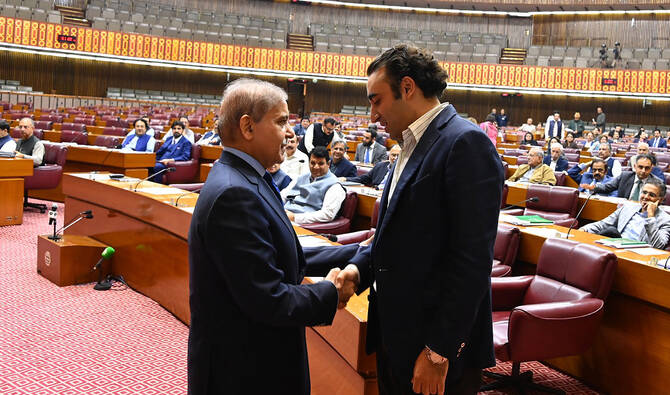PESHAWAR: It is during the month leading up to Eidul Adha that the hustle-bustle of sales at sacrificial markets begins. Nearly 10 million animals are sacrificed in Pakistan every year on Eidul Adha, according to estimates.
While all of Pakistan is busy haggling over the prices of goats, cows, camels and sheep, in Khyber Pakhtunkhwa (KP), the buyer’s favorite is still sheep.
Aman Ullah, a sheep trader in KP’s capital city of Peshawar, told Arab News that the average price he gets for a sheep is about 25,000 rupees, although it can reach a staggering 150,000 rupees (app. $1200). The variation depends on the size and weight of the animal, he explained.
He said 70 percent of all animals sold in the market were sheep. Aman Ullah added: “Its meat is preferred for its distinct taste and the variety of cuisines it is used in, especially in the Pashtun society,” he added, explaining the reason behind the animal being the buyers’ top pick for Eid.
Aslam Khan, a buyer negotiating the price of a sheep at the cattle market, said he buys sheep for sacrifice every year. “There is a big difference in the quality of sheep meat and mutton. The meat is tender and more full of flavor,” he added.
Last-minute sales surge about 10 days before the first day of Eid up until the third day of the festival with an average of 10 sheep being sold a day, said Abdul Rehman, a trader at a sheep market near Shama Cinema in Peshawar.
“Most people buy large animals just a day or two before Eid in the city whereas smaller households cannot accommodate big animals like cows, buffaloes or camels, so the sale of sheep begins a month before Eidul Adha,” said Rehman.
“Sheep are smaller and can be accommodated easily. Parents prefer their children to acquaint themselves with the docile animal, to develop a bond to better understand the concept behind the sacrifice,” he added.
The markets in KP have two major kinds of sheep — ones imported from Afghan and locally raised breeds. Discussing both kinds, trader Ahmed Khan said that he had bought 30 sheep from Talagang area of Punjab to sell for Eid sacrifice.
“The sheep coming from Afghanistan are available for sale but at a lower price because customers prefer the local breed,” he said.
KP cuisine most closely resembles that of neighboring Afghanistan. Typically dishes include very few spices and are cooked with basic ingredients. Meat is generally cooked in its own juices and fat, with tomatoes and green chillies added for flavor. Celebrated dishes include the infamous chapli kabab, dumba karahi and namkeen tikka.
Waris Khan, proprietor of the Lala Azam Shinwari Tikka Karahi in Peshawar’s famous food street Namak Mandi, told Arab News that lamb can be cooked in a variety of ways. People, in KP and elsewhere, all enjoy lamb over mutton and beef — it is more tender and does not require many spices.
People in KP celebrate their culture and cuisine, said Khan, whether by preparing slow-cooked mutton over low flame with the meat and vegetables sealed in a clay pot covered with dough, or cooking a whole lamb with rice and vegetables stuffed inside its body.

























